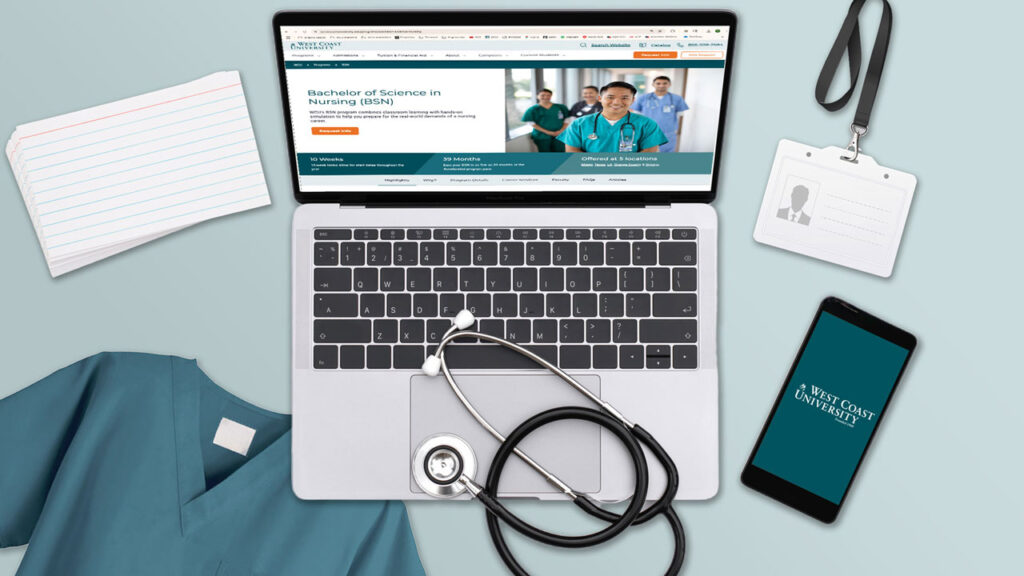What Aspiring Registered Nurse Need to Know About Licensure Testing
The National Council Licensure Exam (NCLEX) is a competency-based exam all student nurses must pass to practice in the United States. This nursing exam provides a comprehensive evaluation of your readiness to enter the healthcare workforce as a nurse. The NCLEX is rigorous and warrants adequate preparation before you sit for the test.
Both the NCLEX-RN (for registered nurses and above) and the NCLEX-PN (for practical nurses) have a five-hour time limit to complete. Individuals with an eligible disability or reason may request accommodations, including extra time, additional breaks, or a separate testing room.
Do I Need to Take the NCLEX?
If you plan to practice as a registered nurse – or as a nurse at any level higher than an RN – you’ll have to take and pass the NCLEX-RN exam. Passing the NCLEX is a requirement of licensure nationwide.
What’s on the NCLEX?
To better understand the content of the actual test, download the NCLEX-RN Test Plan. This provides you with a comprehensive summary of what you’ll be tested on, and how it will be ordered and formatted. This plan is reviewed and updated every three years, so make sure the plan you have is current. Here’s a breakdown of what’s on the test:
- Safe and Effective Care Environment
- Management of Care
- Safety and Infection Control
- Health Promotion and Maintenance
- Psychological Integrity
- Physiological Integrity
- Basic Care and Comfort
- Pharmacological and Parenteral Therapies
- Reduction of Risk Potential
- Physiological Adaptation
Integrated within the above will be the core competencies of nursing, including:
- Nursing process
- Caring
- Communication
- Documentation
- Teaching and learning
- Culture and spirituality
The exam content is distributed in percentages, between 6-23% per topic. (Subject to vary. Reference the current test plan for up-to-date distribution.) Exam content will test your knowledge and comprehension across biological, social, and physical sciences.
Steps to Take the NCLEX
- Apply for licensure with the Nursing Regulatory Body (NRB).
- Register for the exam through Pearson VUE (online recommended).
- Receive your eligibility confirmation from NRB and registration acknowledgment.
- Look for your Authorization to Test (ATT) email.
- Schedule your exam date and time.
- Take the test (tips and guidelines here).
- Receive your results in about six weeks (or two-day quick results for a $7.95 fee).
How to Prepare for the NCLEX-RN
Once you’ve graduated, registered, and received your Authorization to Test (ATT) for your test date, it’s time to do a sanity check that you’re prepared, packed, and ready for your nursing exam.
- Familiarize yourself with the exam format. The NCLEX uses the Computerized Adaptive Test (CAT) format, which means the test is adaptive and no one test is identical.
- Optional: Take a test-prep course through a company like KAPLAN, Hearst Review, or one of many others.
- Practice: Take an NCLEX-RN practice exam or purchase a book of practice questions or online simulation. You can find many questions and practice tests for free online.
- Gather everything you need for Exam Day.
- Don’t forget to rest up before you test up!
What if I Don’t Pass the NCLEX?
If you don’t pass the NCLEX, you can take it again. There is a 45-day waiting period before you can retake the exam. Follow the steps above. (You can skip step one.)
Nervous?
That’s natural. The best way to tame your nerves is to make sure you feel adequately prepared for the test. Here are a few tips to get your facts down and confidence up. Visit our post on test anxiety for strategies on how to combat pre-test stress. It may also be helpful for you to check out our post debunking three common exam prep learning myths.
For more helpful posts to assist you in your nursing school journey and career path, continue reading our blog!
WCU provides career guidance and assistance but cannot guarantee employment. The views and opinions expressed are those of the individuals and do not necessarily reflect the beliefs or position of the school or of any instructor or student.



